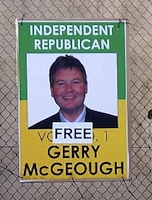
A prominent republican charged with an IRA action almost 30 years ago has said a leading Sinn Fein politician told him he would not face prosecution.
During an application to have his trial stopped, Gerry McGeough said that in July 2000 the current Sinn Fein Stormont Minister Gerry Kelly “conveyed to me that I was free to return to Northern Ireland without fear of being arrested”.
He told Belfast Crown Court the alleged conversation had taken place when he was due to enter a selection process to decide Sinn Fein candidates for a general election.
The Tyrone man is accused of involvement in an attack on a member of the British Army in June 1981 and two counts of being a member of the IRA on dates between January 1975 and June 1981.
Barry McDonald QC, defending Mr McGeough, launched an “abuse of process application” in court yesterday.
He said the case should be stopped because of assurances given to Mr McGeough that he would not be prosecuted and because the length of time the case had taken to come to court had hampered Mr McGeough’s ability to defend himself.
Mr McGeough, a teacher and a former member of the Sinn Fein leadership, told the court he had raised the issue of being ‘on the run’ with politicians Alex Maskey and Mitchel McLaughlin, who directed him to Mr Kelly.
According to Mr McGeough, he spoke with Mr Kelly and was told that following the Good Friday Agreement his coming back to the north to run for election “was not an issue”.
Mr McGeough was eventually arrested in March 2007 as he left a polling station where he was standing for election in Fermanagh and South Tyrone as an independent republican candidate.
Mr McGeough said he was visited by two RUC men in a German prison in 1991 and thought extradition proceedings would be forthcoming but nothing happened.
Under cross-examination from Gordon Kerr QC, prosecuting, Mr McGeough denied that a letter fromthe Northern Ireland Office in January 2003 indicated that he was liable to prosecution.
Mr McGeough said this was “never conveyed to me”.
“When I was given the assurances by Mr Kelly I was of the opinion that this matter had been resolved and in the context of the time everyone was speaking about meeting in resolution of the conflict and for mer ‘enemies’ were sitting around the table,” he said.
“The general Zeitgeist was one of reconciliation. The general thrust was that the Troubles were being put behind us and all that that entailed.”
The court also heard evi dence from William ‘Plum’ Smith, a former chairman of the Progressive Unionist Party who was involved in the Good Friday Agreement negotiations.
He said that during meetings with the British government, including then Direct Ruler Mo Mowlam, it had been stated that the issue of OTRs ‘on the runs’ had been “put.. to one side. There will be no pursuit”.
![[Irish Republican News]](https://republican-news.org/graphics/title_gifs/rn.gif)
![[Irish Republican News]](https://republican-news.org/graphics/title_gifs/harp.gif)

